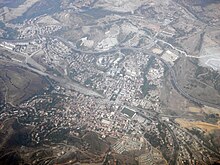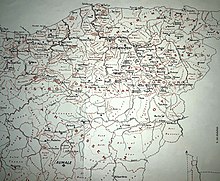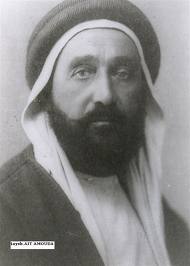Mohamed Seghir Boushaki
[5] After the defeat of the brotherhood of the Rahmaniya in this Kabyle uprising, the tribal leaders were deported to New Caledonia, among them Cheikh Boumerdassi and "Ahmed Ben Belkacem" the chief of the "Aïth Aïcha" who was close to Mohamed Seghir.
[8] Their father "Mohamed Boushaki" (1834–1889), known as "Moh Ouaâli" (Arabic: موح واعلي}, was one of the survivors of the French expedition against the town of Dellys from 7 to 17 May 1844 and which had decimated dozens of villages of Kabylie, including "Thala Oufella (Soumâa)".
[9] Thus, Mohamed Seghir's grandfather, "Ali Boushaki" (1823–1846) who was married to "Khdaouedj Dekkiche" from Gueraïchene village of Souk El-Had, was one of the Kabyle martyrs during the fighting against the French Conquest of Kabylie, leaving his son "Moh Ouaâli" orphaned.
[17][18] The deep recitations and exegesis received by Mohamed Seghir in the Tizi Ouzou Zawiyas, as well as the measured attendance of French settlers, allowed him to anchor in the Berber-Arab culture on the one hand, and to open up on the accomplished fact of the European presence in Kabylie of another coast, thus endowing him with the major trilingual asset for the pursuit of his political and social journey.
[26] The colonial French, surrounded by the German troops and Stormtrooper, appealed to the young Algerians in the ranks of its army in the metropolis with the promise to give them in exchange more rights citizens in Algeria and why not the total independence.
[33][34] Aged 49 at the end of the World War I with nearly ten children in his charge and responsibility, Mohamed Seghir could not venture to live in the Algiers microcosm by taking the risk of forgetting himself and dissolving in the details of the colonial city life far from the expectations of the Kabylian villagers perched on the heights of their mountains and contemplating the European settlers who robbed them of their arable land and their pastures.
It followed the successive arrival of many Kabylian families from Djurdjura, such as "Redjouani" and "Djennadi", to settle among the European settlers in Ménerville (Thenia) and thus promote the emergence of a nationalist consciousness halfway between Tizi Ouzou and Algiers.
As early as 1920, Mohamed Seghir Boushaki with Emir Khaled integrated the political strategy of entrenchment into the administrative apparatus and the colonial cultural sphere, equipped with the elective immunity that enabled them to travel the Department of Algiers without hindrance to meet the nationalist elites of all edges.
This electoral entablature enabled Mohamed Seghir to benefit from several privileges of the position of municipal councilor such as obtaining a concession to operate a farmland of 70 hectares located south-east of the city of Merverville on the flank of the village "Thala Oufella (Soumâa)" and a short distance from Oued Isser.
In 1924, Mohamed Seghir obtained a permit to open a "Moorish Café" in downtown Ménerville overlooking the bustling Avenue de la Republique, where his son M'Hamed Boushaki (1907–1995) went To work with his brothers until the outbreak of the Algerian independence revolution on 1 November 1954.
[46] Little by little Mohamed Seghir became part of the colonial political game and began to position his cousins and relatives in administrative and service jobs in the "Canton of Alma (Boudouaou)" and in Algiers in order to reinforce the Kabyle presence in the capital of their despoiled ancestral land.
[48] Meanwhile, his elder brother "Ali Boushaki" (1855–1965) had taken a theologian route to become one of the muftis of Lower Kabylie according to the Maliki rite and was named Mokaddem of the tarika Rahmaniyya in the region between The Mitidja and the Djurdjura, as well as his position as Imam of the preaching at the Mosque of Ménerville.
30" dated 18 July 1920, where he protested with several of his colleagues to the Senate against the provisions of a bill tabled in the Chamber by the French Government on the regulation of the Indigénat system in Algeria and the accession of Algerians of origin to political rights.







